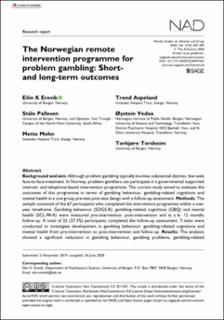| dc.contributor.author | Erevik, Eilin K. | |
| dc.contributor.author | Pallesen, Ståle | |
| dc.contributor.author | Mohn, Mette | |
| dc.contributor.author | Aspeland, Trond | |
| dc.contributor.author | Vedaa, Øystein | |
| dc.contributor.author | Torsheim, Torbjørn | |
| dc.date.accessioned | 2021-02-12T11:31:06Z | |
| dc.date.available | 2021-02-12T11:31:06Z | |
| dc.date.created | 2020-06-24T13:30:16Z | |
| dc.date.issued | 2020 | |
| dc.identifier.citation | Nordic Studies on Alcohol and Drugs. 2020, 37 (4), 365-383. | en_US |
| dc.identifier.issn | 1455-0725 | |
| dc.identifier.uri | https://hdl.handle.net/11250/2727712 | |
| dc.description.abstract | Abstract Background and aim: Although problem gambling typically involves substantial distress, few seek face-to-face treatment. In Norway, problem gamblers can participate in a governmental supported internet- and telephone-based intervention programme. The current study aimed to evaluate the outcomes of this programme in terms of gambling behaviour, gambling-related cognitions and mental health in a one group pre-test post-test design with a follow-up assessment. Methods: The sample consisted of the 67 participants who completed the intervention programme within a one-year timeframe. Gambling behaviour (SOGS-R), gambling-related cognitions (GBQ) and mental health (SCL-90-R) were measured pre-intervention, post-intervention and at a 6−12 months follow-up. A total of 25 (37.3%) participants completed the follow-up assessment. T-tests were conducted to investigate development in gambling behaviour, gambling-related cognitions and mental health from pre-intervention to post-intervention and follow-up. Results: The analyses showed a significant reduction in gambling behaviour, gambling problems, gambling-related cognitive distortions and mental health symptoms from pre-intervention to post-intervention and follow-up. The corresponding effect sizes for the reductions in gambling and gambling-related cognitive distortions were very large, while the effect sizes for the reductions in mental distress were moderate. Conclusion: The internet/telephone programme appears to have several positive outcomes including reduction in gambling behaviour, gambling problems, gambling-related cognitive distortions and symptoms of mental disorders both in the short and long term. Another positive outcome of participation appears to be a lowered threshold for seeking additional treatment. The current study entails, however, important limitations, and future studies should investigate the outcomes of the programme while including a control group. Keywords cognitive behavioural therapy, gambling, mental health, problem gambling, remote therapy, telemental health applications | en_US |
| dc.language.iso | eng | en_US |
| dc.publisher | Sage Journals | en_US |
| dc.relation.uri | https://journals.sagepub.com/doi/pdf/10.1177/1455072520947247 | |
| dc.rights | Navngivelse 4.0 Internasjonal | * |
| dc.rights.uri | http://creativecommons.org/licenses/by/4.0/deed.no | * |
| dc.title | The Norwegian remote intervention program for problem gambling: Short- and long-term outcomes | en_US |
| dc.type | Peer reviewed | en_US |
| dc.type | Journal article | en_US |
| dc.description.version | publishedVersion | en_US |
| dc.source.pagenumber | 365-383 | en_US |
| dc.source.volume | 37 | en_US |
| dc.source.journal | Nordic Studies on Alcohol and Drugs | en_US |
| dc.source.issue | 4 | en_US |
| dc.identifier.doi | 10.1177/1455072520947247 | |
| dc.identifier.cristin | 1816957 | |
| dc.description.localcode | Creative Commons Non Commercial CC BY-NC: This article is distributed under the terms of the Creative Commons Attribution-NonCommercial 4.0 License (https://creativecommons.org/licenses/ by-nc/4.0/) which permits non-commercial use, reproduction and distribution of the work without further permission provided the original work is attributed as specified on the SAGE and Open Access pages (https://us.sagepub.com/en-us/nam/ open-access-at-sage) | en_US |
| cristin.ispublished | true | |
| cristin.fulltext | original | |
| cristin.qualitycode | 1 | |

